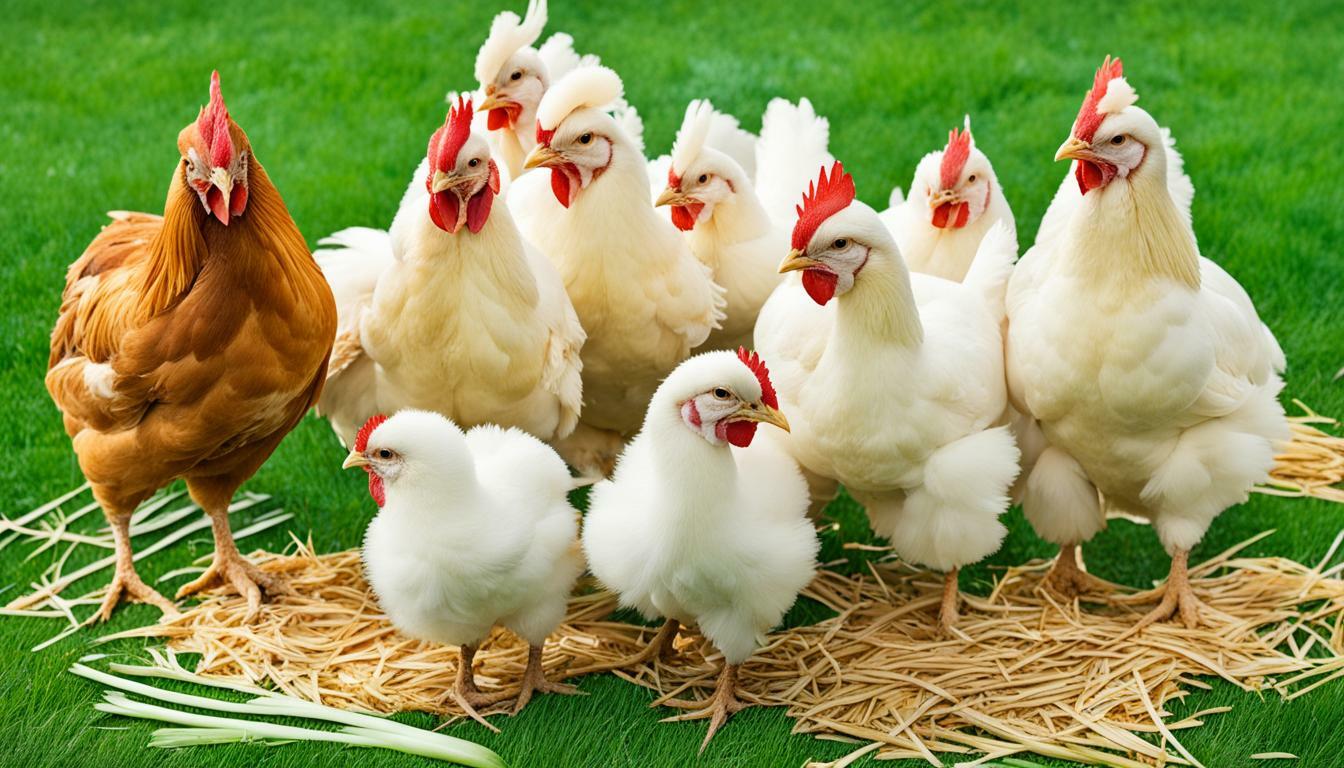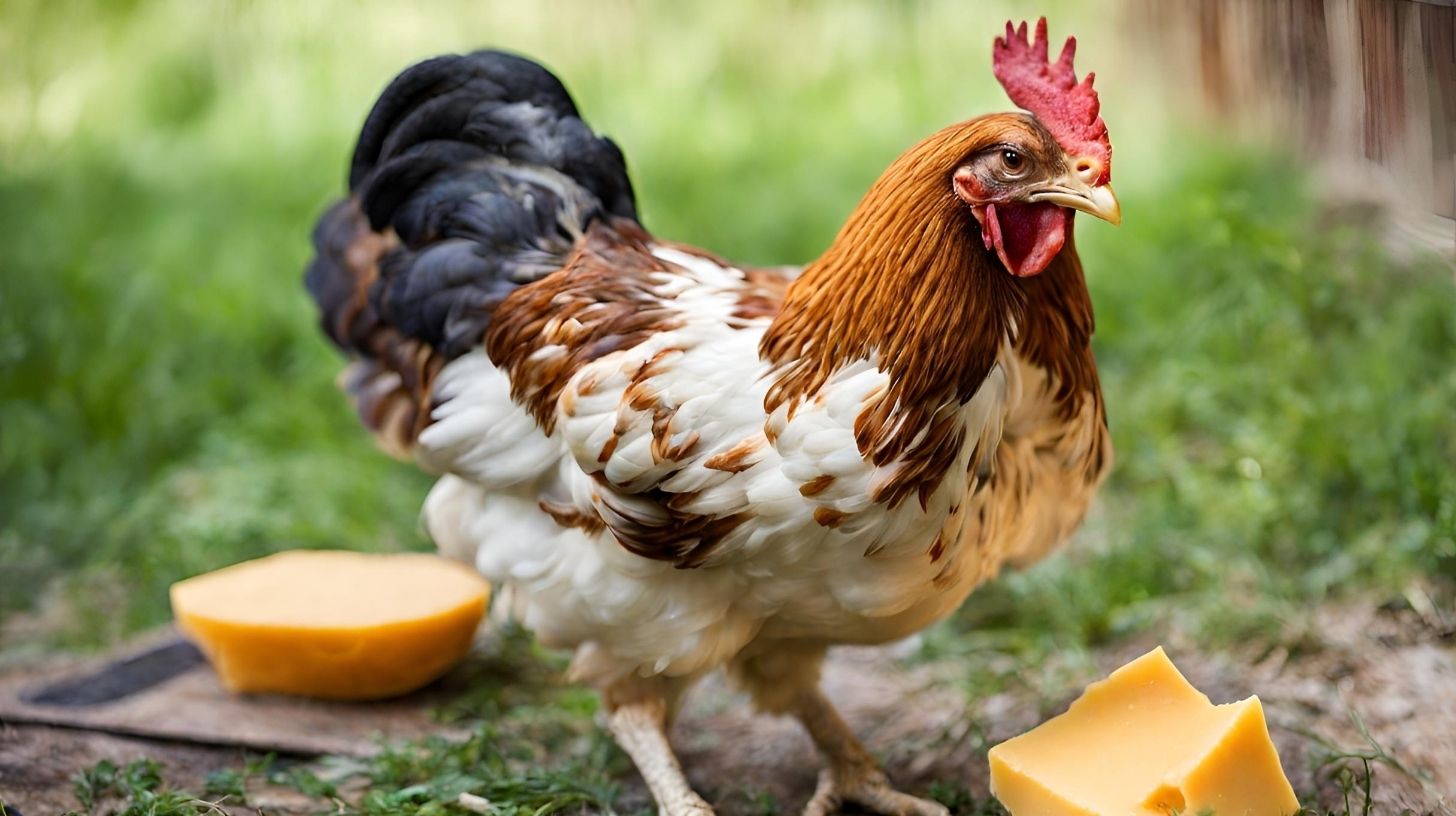Can Chickens Eat Pomegranates? Learn the Benefits And Risks

Table of content:
- Can Chickens Eat Pomegranate Seeds?
- Are Pomegranates Safe For Chickens?
- What Parts Of Pomegranate Can Chickens Eat?
- How Much Pomegranate Can Chickens Eat?
- Are Pomegranates Good For Chickens?
- Best Ways To Feed Chickens Pomegranates
- Are Pomegranates Bad For Chickens?
- Frequently Asked Questions About Chickens Eating Pomegranates
- Conclusion
Pomegranates are a nutritious fruit enjoyed by humans for centuries. But can chickens eat pomegranates too? Let’s explore the key factors to consider when feeding pomegranates to chickens.
Key Takeaways:
- Pomegranates contain healthy antioxidants, vitamins, and minerals. But portions should be limited due to high sugar content.
- The seeds and the peel of pomegranates can be fed to chickens. Avoid giving too much of the pulp/arils.
- Feed only ripe pomegranates in moderation as treats. Too much can cause loose stools.
- Gradually introduce pomegranates. Monitor chickens for any adverse reactions.
- Pomegranates don’t provide complete nutrition. Offer as supplement to a balanced diet.
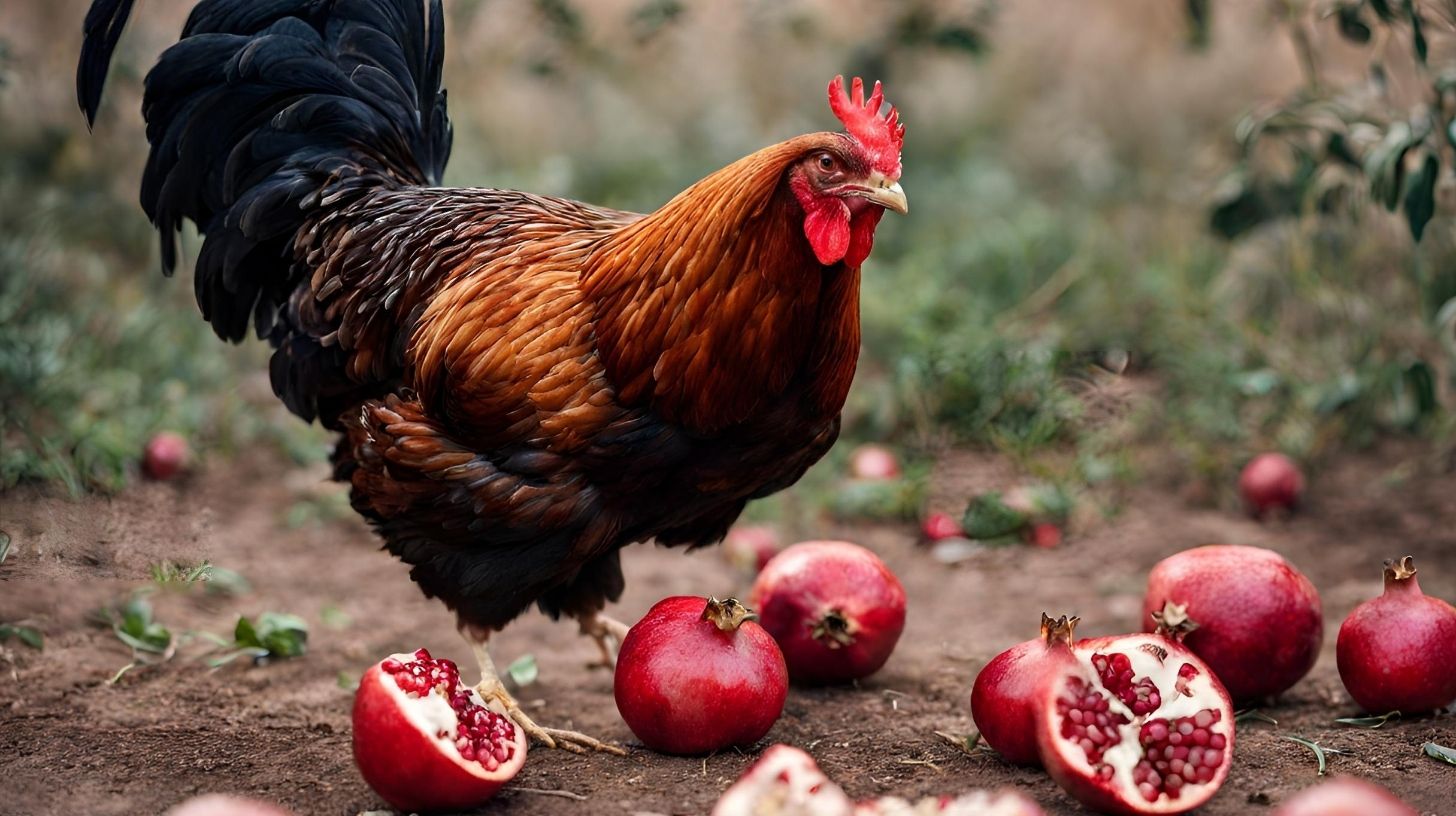 Can Chickens Eat Pomegranate Seeds?
Can Chickens Eat Pomegranate Seeds?
Pomegranates contain hundreds of edible ruby-red seeds or arils surrounded by inedible membranes. Can chickens eat pomegranate seeds?
Yes, chickens can safely eat pomegranate seeds. The seeds are soft, easy to digest, and rich in nutrients like:
- Vitamin C
- Vitamin K
- Fiber
- Folate
- Potassium
In particular, the antioxidants in pomegranates can help boost chickens’ immunity.
However, pomegranate seeds are high in natural sugar. Feed no more than 1-2 seeds per day as treats. Too much can cause digestive issues in chickens.
Are Pomegranates Safe For Chickens?
Pomegranates are not toxic to chickens. Both the juicy seeds and the leathery outer peel are safe for chickens to eat.
However, everything should be fed in moderation. Too many pomegranates can lead to:
- Digestive upset
- Runny stool
- Diarrhea
Make sure any pomegranates fed to chickens are ripe. Unripe fruit can be more acidic and cause stomach upset.
Introduce pomegranates slowly at first. Monitor chickens closely for any adverse reactions like diarrhea. Remove pomegranates from their diet if issues develop.
| Risk | Cause | Prevention |
|---|---|---|
| Diarrhea | Excess Sugar | Feed in Moderation |
| Dehydration | Diuretic Effect | Provide Water |
| Obesity | High Calories | Portion Control |
| Nutritional Imbalance | Incomplete Nutrition | Well-Balanced Diet |
| Internal Parasites | Disrupted Gut Flora | Varied Diet |
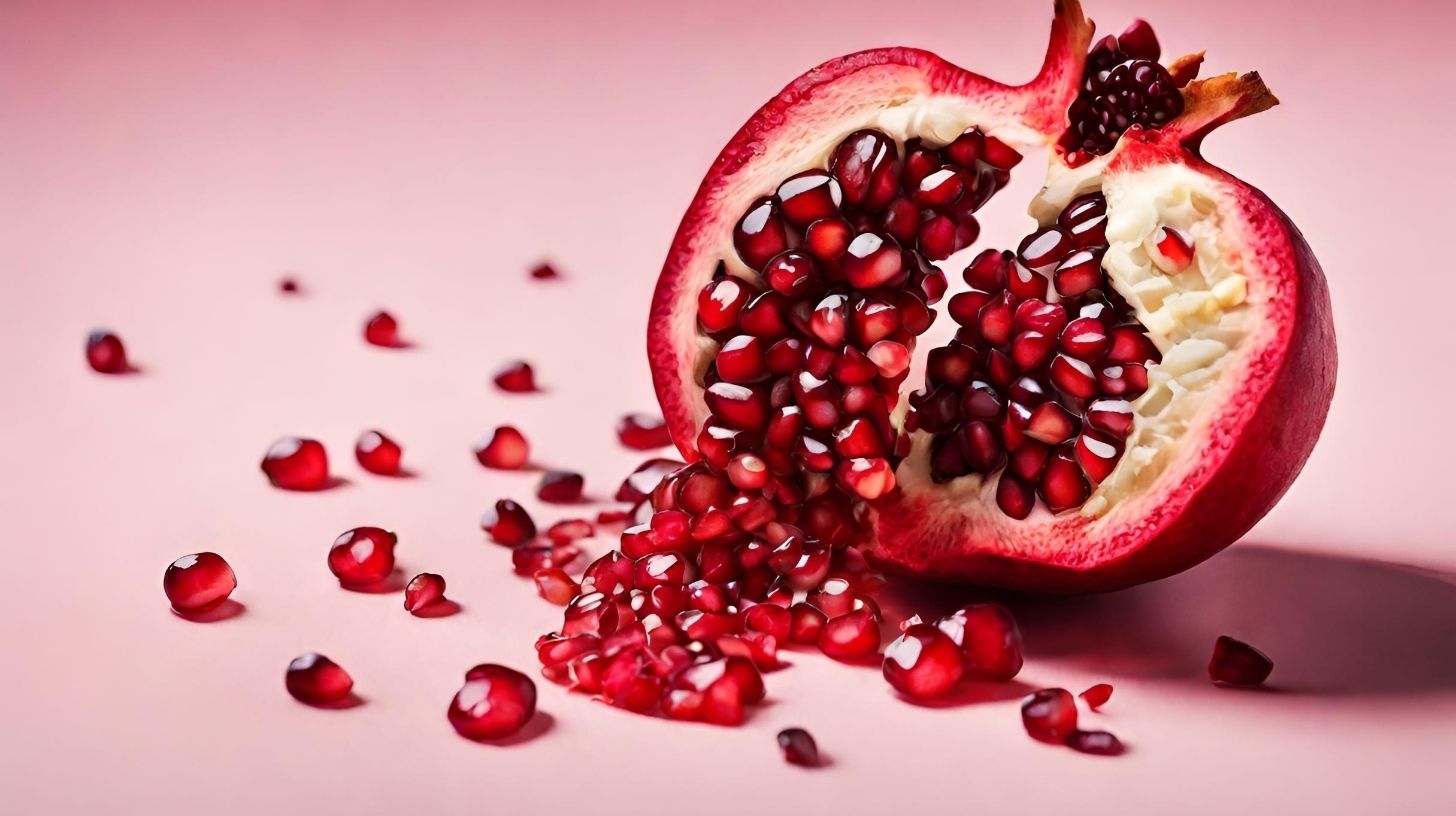 What Parts Of Pomegranate Can Chickens Eat?
What Parts Of Pomegranate Can Chickens Eat?
Chickens can eat the following pomegranate parts:
- Seeds
- Peel
- Membranes
Avoid feeding chickens too much of the juicy, sugary pulp/arils surrounding the seeds.
The red pulp is safe but may loosen stool consistency. The white pith membranes have higher fiber content to promote digestion.
Pomegranate peel is fully edible for chickens. It contains tannins that can help with intestinal health and parasite resistance. Just feed peeled pieces in moderation.
| Part | Safe to Eat? | Purpose |
|---|---|---|
| Seeds | Yes | Treats, Fiber, Nutrients |
| Peel | Yes | Fiber, Gut Health |
| Pulp/Arils | In Moderation | Treats, Avoid Too Much |
| Leaves | No | Non-Edible |
How Much Pomegranate Can Chickens Eat?
Pomegranates should only be fed to chickens as an occasional treat, not daily diet.
Limit intake to a few seeds or pieces of peel 1-2 times per week.
Never feed more than 1-2 tablespoons of pomegranate arils per chicken. The high sugar content can lead to health issues.
Free-range chickens may naturally nibble on fallen pomegranates in the garden. But portions should still be restricted as part of a balanced diet.
Are Pomegranates Good For Chickens?
Pomegranates provide nutritional benefits for chickens, including:
- High vitamin C content to support immunity
- Antioxidants that combat cell damage
- Dietary fiber to aid digestion
- Minerals like potassium, calcium, phosphorus
- Polyphenols to boost gut health
However, chickens should not get too much dietary sugar from any single fruit. Pomegranates are healthy for chickens in moderation but may cause issues if overfed.
| Nutrient | Benefit |
|---|---|
| Vitamin C | Immunity |
| Antioxidants | Combat Cell Damage |
| Fiber | Digestive Health |
| Potassium | Nerve Function |
| Calcium | Bone Strength |
| Phosphorus | Bone Formation |
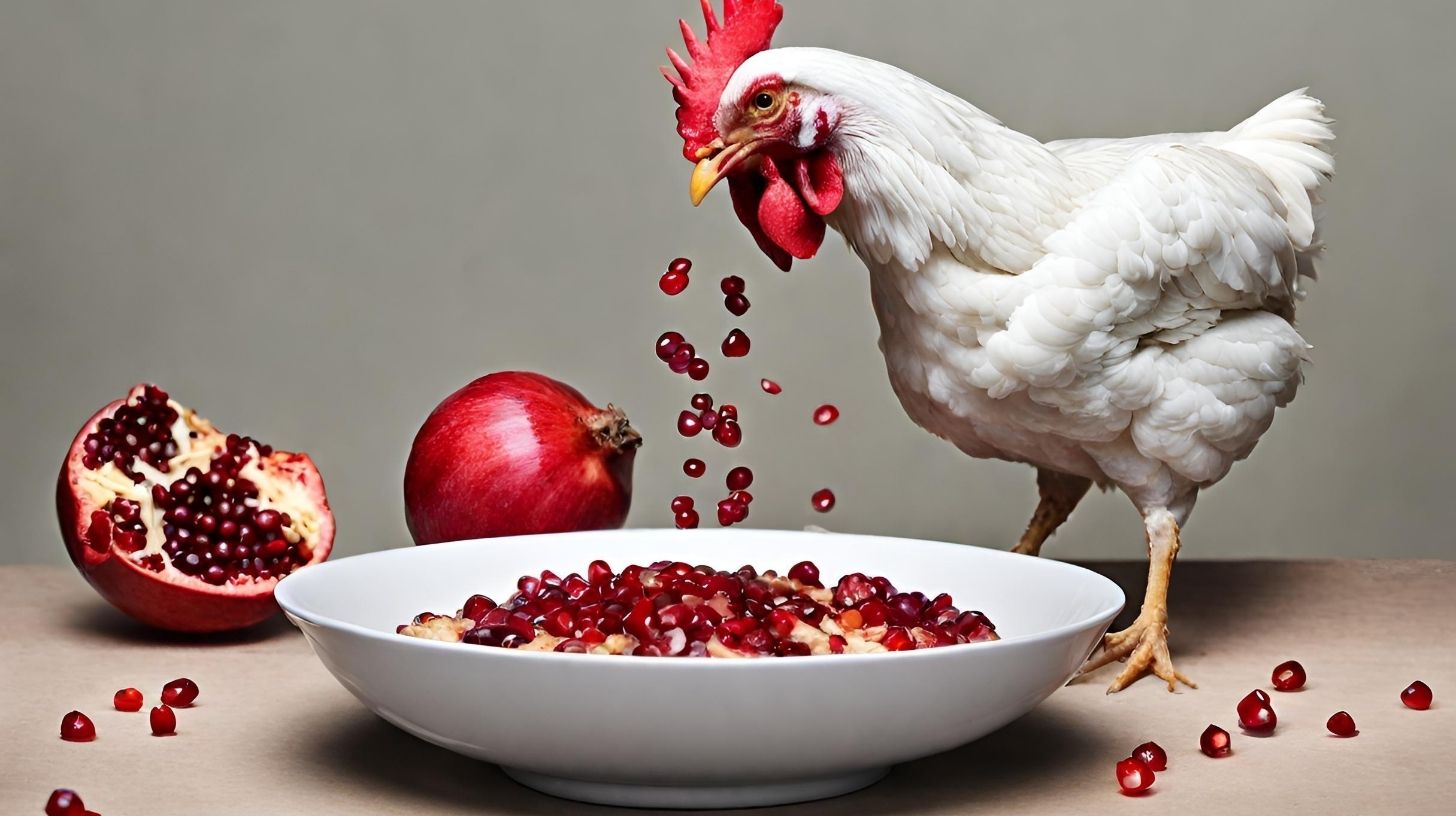 Best Ways To Feed Chickens Pomegranates
Best Ways To Feed Chickens Pomegranates
Here are some tips for safely feeding pomegranates:
- Wash thoroughly to remove dirt and pesticides if store-bought
- Cut open and scoop out arils
- Mash arils lightly to break membranes
- Mix small amount of mashed arils into feed
- Offer seeds or peeled pieces of rind separately as treats
- Start with 1-2 times a week. Gradually increase to 2-3 times per week in limited portions if chickens tolerate well.
- Provide adequate grit to help break down seeds
- Ensure plenty of fresh water to avoid dehydration
- Watch for loose droppings and reduce or eliminate pomegranates if observed
- Do not replace balanced feed. Offer pomegranates sparingly as supplements.
Are Pomegranates Bad For Chickens?
Pomegranates are not toxic or poisonous to chickens. However, they do come with some risks if overfed, including:
Digestive upset: Too much pomegranate may upset digestive tract and cause diarrhea.
Impact on feed consumption: Chickens may fill up on tasty fruit rather than eating a balanced diet.
Nutritional imbalance: Pomegranates are healthy but don’t provide complete nutrition. Can’t replace chicken feed.
High in sugar: Excessive sugar from fruit can cause obesity, liver issues, and other health problems in chickens long-term.
Dehydration: Pomegranates have diuretic effect. Adequate water is essential to avoid dangerous dehydration.
Internal parasites: Too much of any single fruit may disrupt gut flora and increase susceptibility to parasites. Variety is important.
As long as pomegranates are fed in moderation as supplements, chickens can enjoy them safely. Monitor your flock’s droppings and overall health when introducing new treats.
Frequently Asked Questions About Chickens Eating Pomegranates
Can I give my chickens pomegranates everyday?
No, pomegranates should only be fed in moderation 1-2 times per week at most. The high sugar content can cause health issues if chickens eat pomegranates daily.
What part of pomegranate can chickens eat?
Chickens can eat the seeds, membranes, peel, and pulp. But limit high-sugar pulp. The peel and membranes are healthiest options.
Do chickens like pomegranate?
Chickens are attracted to the bright color, juices, and sweet taste of pomegranates. Most enjoy them as part of a varied diet.
Are pomegranates a good source of protein for chickens?
No, pomegranates are low in protein compared to chicken feed. Seeds provide some protein but should not replace feed as main source.
Can too much pomegranate kill chickens?
Pomegranates are non-toxic. But overfeeding may cause health issues. Anything in extreme excess can be dangerous. Feed pomegranates as supplements only.
How much pomegranate peel can I feed per chicken?
No more than one or two 3-4 inch pieces of pomegranate peel per chicken, 2-3 times per week at most.
Conclusion
In conclusion, chickens can eat pomegranates safely in moderation. Pomegranates provide healthy antioxidants, vitamins, and minerals. But the high sugar content requires portions to be limited.
The seeds, membranes, peel, and pulp are all edible. But the seeds and peel are healthiest for chickens. Avoid too much pulp/arils which are higher in sugar.
Slowly introduce ripe pomegranates as occasional treats. Never replace balanced feed. Monitor chickens closely and watch for signs of digestive upset.
Feeding a few pomegranate seeds or pieces of peel provides a safe way to offer chickens variety and enrichment. But always supervise and feed as part of a nutritious diet.
Welcome. I’m Adreena Shanum, the proud owner of this website, and I am incredibly passionate about animals, especially poultry. I founded adreenapets.com as a labor of love, stemming from my desire to share my knowledge and experiences with poultry enthusiasts worldwide.


